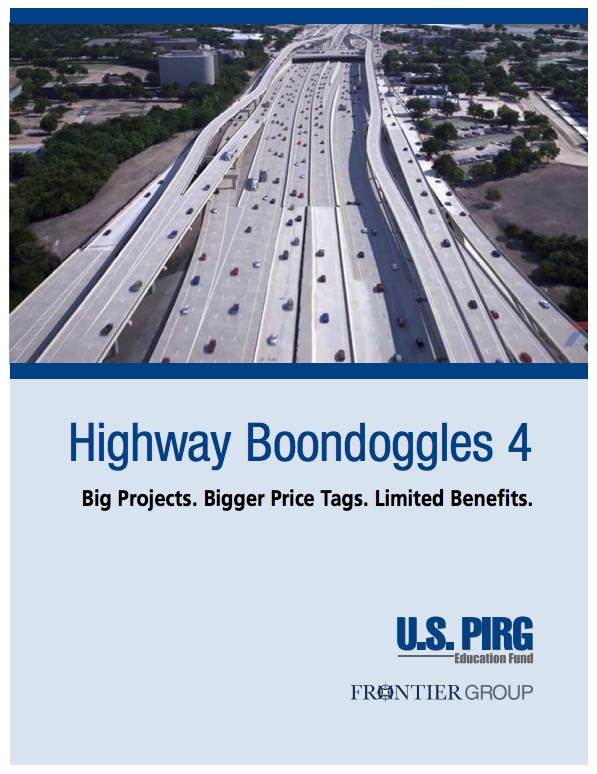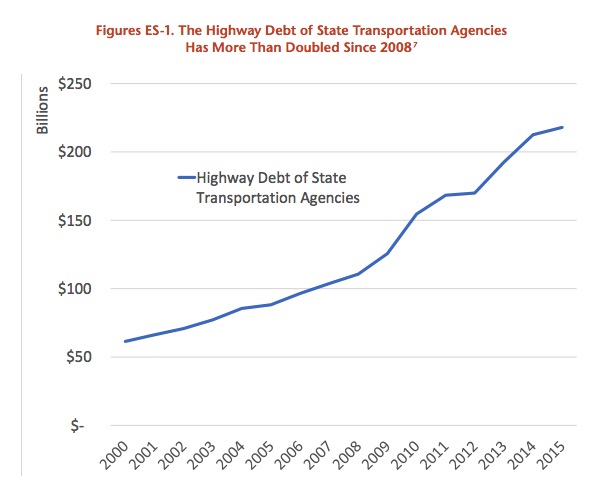U.S. PIRG EDUCATION FUND
FRONTIER GROUP
Executive Summary
 America’s infrastructure is in rough shape. Many of our roads, bridges and transit systems are aging and in need of repair.
America’s infrastructure is in rough shape. Many of our roads, bridges and transit systems are aging and in need of repair.
Yet, year after year, state and local governments propose billions of dollars’ worth of new and expanded highways that often do little to reduce congestion or address real transportation challenges, while diverting scarce funding from infrastructure repairs and 21st century transportation priorities.
Nine proposed highway expansion projects across the country – slated to cost $30 billion – exemplify the need for a fresh approach to transportation planning and spending. As America considers how to meet its infrastructure needs in a fiscally responsible way, the nation cannot afford expensive “boondoggle” projects that don’t meet our most important transportation needs.
Highway expansion costs transportation agencies billions of dollars, driving them further into debt, while failing to address our long-term transportation challenges.
Highway expansion absorbs money that can be used for more pressing needs.
- In 2012 (the last year for which data is available), federal, state and local governments spent $27.2 billion on expanding the highway system – consuming more than one out of every four capital dollars spent on the nation’s road network.
- Continued spending on highway expansion diverts funds that could be used to address the nation’s roughly half trillion-dollar backlog of road and bridge repair needs and its $90 billion backlog of transit repair needs, as well as to expand transportation choices for Americans through investments in public transportation.
Highway expansion saddles states with debt.
- Amid stagnating gas tax revenue, states have increasingly paid for highway expansions with borrowed money.
- From 2008 to 2015, the highway debt held by state transportation agencies more than doubled, from $111 billion to $217 billion, while state fuel tax revenue increased by only 20 percent.3 As a result, retiring and making payments on old debt – debt service – has become increasingly expensive. In 2014, states spent $28 billion on debt service, representing 29 percent of all state highway spending.
Highway expansion doesn’t solve congestion.
- Expanding highways draws new drivers to the roads, often resulting in a rapid return to the congested conditions the expansion project was originally supposed to solve. The return to congestion after a road expansion is so predictable it has been called the “Fundamental Law of Road Congestion.”
- For example, recent billion-dollar expansions of I-35W in Fort Worth, the Katy Freeway in Texas and Interstate 405 in California failed to significantly improve congestion, with commute times on the Katy Freeway actually increasing following expansion.
States continue to spend billions of dollars on new or expanded highways that fail to address real problems with our transportation system, while adding new long-term fiscal and maintenance obligations. In some cases, officials are proposing to tack expensive highway expansions onto necessary repair and reconstruction projects, while other projects represent entirely new construction. Many of these projects began or were first proposed years or decades ago, or are based on highly questionable assumptions about economic impacts.
Questionable projects poised to absorb billions of scarce transportation dollars include:
- “Traffic Relief Plan;” Maryland; $9 billion – A plan to spend $9 billion on new highways comes as Maryland struggles to fix the Baltimore Metro, which was forced to close for urgent repairs in February 2018.
- I-49 Inner City Connection; Shreveport, Louisiana; $547 million to $640 million – A proposed new highway would slice through the heart of a neighborhood.
- U.S. Highway 101 Expansion; San Mateo, California; $534 million – Widening U.S. Highway 101 in the San Mateo area will bring more cars into an already congested area, while directly conflicting with California’s global warming goals.
- Interstate 35 Expansion; Austin, Texas; $8.1 billion – Despite enormous state highway debt, and the growing need for transit and complete streets to create more compact and connected neighborhoods, policymakers have proposed spending $8 billion to expand I-35 through the middle of Austin.
- LBJ East Expansion; Dallas, Texas; $1.6 billion – The costly expansion of an already enormous highway will create 14 lanes (plus two frontage roads) of roadway.
- Pennsylvania Turnpike Expansion; $6.9 billion – Despite a precarious financial situation that threatens transit systems across the state, the Pennsylvania Turnpike Commission is undertaking an expensive highway widening project on 470 miles of highway.
- I-94 North South Expansion; Wisconsin; $1.7 billion to $1.9 billion – A highway expansion that would drain resources from other state projects is moving forward as part of an economic incentive package for electronics manufacturing company Foxconn.
- I-285 & SR 400 Interchange Rebuilding; Atlanta, Georgia; $596 million – An expensive interchange project is moving forward even as Atlanta residents clamor for more and better transit.
- North Spokane Corridor; Spokane, Washington; $1.5 billion – A proposed highway will slice through a historic Spokane neighborhood and take money from other transportation priorities, in order to take just minutes off the drive to low-density suburbs north of the city
Previous Highway Boondoggles reports identified 32 dubious highway expansion projects costing an estimated $47 billion that merited additional scrutiny. Of those projects, nine have been canceled, are on hold, or are under significant revision. Those projects include the following:
- The Florida Department of Transportation cancelled plans to build new lanes along I-275 in Tampa between I-4 and Bearss Avenue, citing community opposition to the plan. Other elements of the Tampa Bay Next project are still moving forward.
- The Dallas Trinity Parkway was canceled after community-led opposition to the proposed toll road led to new questions over the project’s funding and its impact on the community.
- The Illiana Expressway tollway in Indiana and Illinois was suspended amid budget concerns and has been the subject of court challenges that leave its future in severe doubt.
- Wisconsin abandoned a proposal to widen I-94 East West in Milwaukee after the project was denied funding due to the state budget crunch and strong opposition from community groups.
- After receiving feedback that the plan to widen I-94 through Detroit would harm the city, transportation officials are considering modifications to the plan that would keep the highway’s existing footprint, create “complete streets” overpasses with improved pedestrian and bicycle infrastructure, and make better use of existing city streets for neighborhood connections.
- An extension to the Tesoro toll road in southern California was put on hold on the grounds that it, and a future additional extension, would threaten local water resources.
Federal, state and local governments should stop or downsize unnecessary or low-priority highway projects to free up resources for pressing transportation priorities.
Specifically, policy-makers should:
- Invest in transportation solutions that reduce the need for costly and disruptive highway expansion projects. Investments in public transportation, changes in land-use policy, road pricing measures, and technological measures that help drivers avoid peak-time traffic, for example, can often address congestion more cheaply and effectively than highway expansion.
- Adopt fix-it-first policies that reorient transportation funding away from newer and wider highways and toward repair of existing roads, bridges and transit systems.
- Use the latest transportation data and require full cost-benefit comparisons, including future maintenance needs, to evaluate all proposed new and expanded highways. This includes projects proposed as public-private partnerships.
- Give priority funding to transportation projects that reduce growth in vehicle-miles traveled, to account for the public health, environmental and climate benefits resulting from reduced driving.
- Invest in research and data collection to better track and react to ongoing shifts in how people travel.
Expanding highways does little to reduce congestion or address real transportation challenges, and diverts scarce funding from infrastructure repairs and 21st century transportation priorities.
Download full version (PDF): Highway Boondoggles 4
About the U.S. PIRG Education Fund
www.uspirgedfund.org
U.S. PIRG Education Fund conducts research and public education on behalf of consumers and the public interest. Our research, analysis, reports and outreach serve as counterweights to the influence of powerful special interests that threaten our health, safety or well-being.
About Frontier Group
frontiergroup.org
Frontier Group provides information and ideas to help citizens build a cleaner, healthier, fairer and more democratic America. We address issues that will define our nation’s course in the 21st century – from fracking to solar energy, global warming to transportation, clean water to clean elections. Our experts and writers deliver timely research and analysis that is accessible to the public, applying insights gleaned from a variety of disciplines to arrive at new ideas for solving pressing problems.
Tags: Frontier Group, Highway boondoggles, U.S. PIRG, U.S. PIRG Education Fund







 RSS Feed
RSS Feed